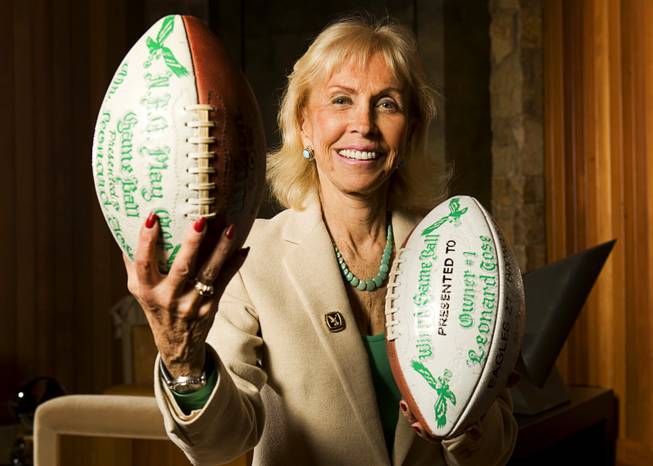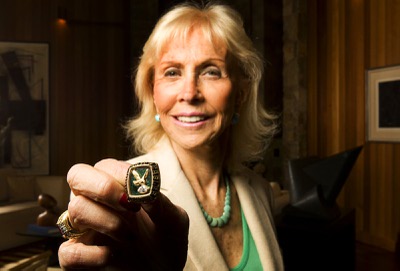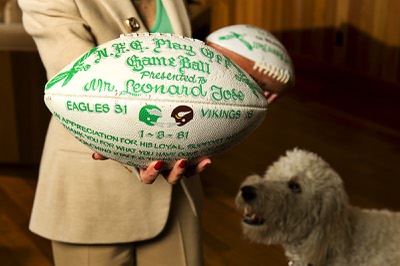
Susan Tose Spencer, former general manager of the NFL’s Philadelphia Eagles, poses with game footballs at her home in Las Vegas Tuesday, April 26, 2011. Spencer brings a unique perspective to the ongoing lockout of NFL players by the league’s owners. As an executive with the Eagles, she participated in the 1982 NFL lockout. Her late father, Leonard Tose, was the team’s owner at the time.
Wednesday, April 27, 2011 | 2:05 a.m.
NFL labor dispute
KSNV coverage of NFL labor dispute, April 26, 2011.

Susan Tose Spencer, former general manager of the NFL's Philadelphia Eagles, displays a ring from Super Bowl XV at her home in Las Vegas Tuesday, April 26, 2011. (The Oakland Raiders beat the Eagles 27-10). Spencer brings a unique perspective to the ongoing lockout of NFL players by the league's owners. As an executive with the Eagles, she participated in the 1982 NFL lockout. Her late father, Leonard Tose, was the team's owner at the time.

Susan Tose Spencer, former general manager of the NFL's Philadelphia Eagles, holds a game football from the 1981 National Football Conference playoff game against the Minnesota Vikings at her home in Las Vegas Tuesday, April 26, 2011. Spencer brings a unique perspective to the ongoing lockout of NFL players by the league's owners. As an executive with the Eagles, she participated in the 1982 NFL lockout. Her late father, Leonard Tose, was the team's owner at the time.
If talk radio can be believed, more fans of the National Football League are siding with the players than the team owners in their bitter labor dispute. But it’s no surprise Las Vegas resident Susan Tose Spencer sympathizes with the owners.
That’s because her late father, Leonard Tose, once owned the Philadelphia Eagles, guiding the team to its first Super Bowl in January 1981. She, too, served the team in the early 1980s as its attorney and general manager, the first woman in league history to hold the latter position.
It was during her tenure that the players went on a 57-day strike in 1982 over pay and benefits that prompted a lockout and forced the league to shorten its regular season by five games. So she brings a unique perspective to the current labor battle, which is being waged in federal court.
With $9 billion in annual NFL revenue at stake, her take is that the owners deserve substantially more than the current deal, which guarantees them $1 billion but gives the players 60 percent of the remaining revenue.
“The players are employees, but they’re not taking any risks,” she said Tuesday. “They’re not spending any money on expenses.
“As a business owner, I say it’s my business, because I put the money up. If I buy a new franchise today, I’m spending $800 million to $900 million, and I may have to borrow money to build a new stadium. It’s all my risk.”
Spencer said that with cities and states becoming less willing to use tax dollars to fund new stadiums or refurbish existing ones, it makes sense to give the owners a greater share of the revenue to help them invest in those facilities.
“If I put a new stadium in, that generates more home revenue and the players are getting a cut of it,” she said.
Although the NFL maintains that it has worked hard to achieve parity among teams on the field, Spencer said, she believes the owners are not as unified today as they were in the 1980s because of growing financial differences between big- and small-market teams. Forbes.com valued the Dallas Cowboys at $1.8 billion, almost triple the smallest market teams.
Likewise, she said, players are not as unified as they once were because more rely on their own attorneys for advice.
But she predicted that no more than two regular season games would be lost in the upcoming season, believing the two sides will reach at least a temporary agreement, because so much is at stake financially.
“I think there will be a season, but it will depend on how hard the players press,” Spencer said. “If they go for the jugular and keeping suing the league, the owners will have no choice but to stay out, because they can’t fight 50 lawsuits. They’ll just hang up their shingles and say, ‘We’re done.’”
Among the differences Spencer sees between the 1982 strike and the current dispute is in the way the players union chiefs conduct themselves. She said that Ed Garvey, the union representative in 1982, was on his way out of that post and appeared more willing to work with the owners than she believes is the case with DeMaurice Smith, current executive director of the NFL Players Association.
Smith, she said, projects an adversarial image that can lead to “a lot of negative vibes from team to team.”
She cites as an example his refusal to compromise on a union demand for the teams to open their financial records to the players. The teams were willing to give the union five years worth of records that averaged out the revenues and expenses of each of the 32 teams and ranked them, as long as the individual teams weren’t identified, she said.
Spencer also said that by decertifying the union, the players unwittingly placed themselves at risk of being sued by the owners for collusion.
As for the legal dispute itself, Spencer wasn’t impressed with Monday’s ruling by U.S. District Judge Susan Richard Nelson to end the owners’ lockout of the players. The owners immediately appealed to the 8th U.S. Circuit Court of Appeals and also requested that Nelson issue a stay of her ruling pending action from the appellate court.
Spencer, who authored a book, “Briefcase Essentials,” on her life as an entrepreneur, said the appellate court should reverse Nelson’s ruling because it was counter to established federal law related to injunctions.
“That ruling was awful,” she said.

Join the Discussion:
Check this out for a full explanation of our conversion to the LiveFyre commenting system and instructions on how to sign up for an account.
Full comments policy